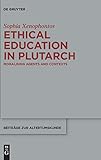Ethical Education in Plutarch : Moralising Agents and Contexts / Sophia Xenophontos.
Material type: TextSeries: Beiträge zur Altertumskunde ; 349Publisher: Berlin ; Boston : De Gruyter, [2016]Copyright date: ©2016Description: 1 online resource (X, 266 p.)Content type:
TextSeries: Beiträge zur Altertumskunde ; 349Publisher: Berlin ; Boston : De Gruyter, [2016]Copyright date: ©2016Description: 1 online resource (X, 266 p.)Content type: - 9783110350364
- 9783110383317
- 9783110350463
- 888 23
- PA4382 .X46 2016
- PA4383
- online - DeGruyter
- Issued also in print.
| Item type | Current library | Call number | URL | Status | Notes | Barcode | |
|---|---|---|---|---|---|---|---|
 eBook
eBook
|
Biblioteca "Angelicum" Pont. Univ. S.Tommaso d'Aquino Nuvola online | online - DeGruyter (Browse shelf(Opens below)) | Online access | Not for loan (Accesso limitato) | Accesso per gli utenti autorizzati / Access for authorized users | (dgr)9783110350463 |
Frontmatter -- Contents -- Preface -- Editions, abbreviations, and other conventions -- Symbols, orthography, and transliteration of Greek terms -- Introduction -- Chapter 1. Character change and character development in Plutarch: the significance of education in a range of settings -- Chapter 2. Moral education between parents and children -- Chapter 3. Moral training in the classroom -- Chapter 4. The marital chamber as a school for well-ordered comportment: women’s education -- Chapter 5. Politics as a site of moral education -- Chapter 6. Moralising in the military field: Plutarch and the ethics of generalship -- Chapter 7. Educating over wine: moral pedagogy in Plutarch’s Table Talk -- Conclusion -- Bibliography -- Index of names and topics -- Index of Plutarchan passages -- Index of passages in other authors
restricted access online access with authorization star
http://purl.org/coar/access_right/c_16ec
In addition to being the author of the Parallel Lives of noble Greeks and Romans, Plutarch of Chaeronea (AD c.46-c.120) is widely known for his rich ethical theory, which has ensured him a reputation as one of the most profound moralists in antiquity and beyond. Previous studies have considered Plutarch's moralism in the light of specific works or group of works, so that an exploration of his overall concept of ethical education remains a desideratum. Bringing together a wide range of texts from both the Parallel Lives and the Moralia, this study puts the moralising agents that Plutarch considers important for ethical development at the heart of its interpretation. These agents operate in different educational settings, and perform distinct moralising roles, dictated by the special features of the type of moral education they are expected to enact. Ethical education in Plutarch becomes a distinctive manifestation of paideia vis-à-vis the intellectual trends of the Imperial period, especially in contexts of cultural identity and power. By reappraising Plutarch's ethical authority and the significance of his didactic spirit, this book will appeal not only to scholars and students of Plutarch, but to anyone interested in the history of moral education and the development of Greek ethics.
Issued also in print.
Mode of access: Internet via World Wide Web.
In English.
Description based on online resource; title from PDF title page (publisher's Web site, viewed 28. Feb 2023)


